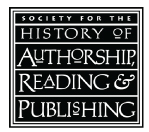Will Slauter
Election
Position
Name
Will Slauter
Candidate statement
Will Slauter. Associate professor at Université Paris Diderot, and a junior fellow of the Institut universitaire de France.
I received my PhD in history from Princeton University in 2007 and taught at Columbia University and Florida State University before relocating to France in 2010. My main research interests are the history of publishing (especially newspapers) and copyright law in Britain and the United States. My latest publication is Who Owns the News? A History of Copyright (Stanford, 2019). Recently I have been collaborating with art historians and legal scholars to explore the development of artistic copyright and the circulation of images in the nineteenth century.
I’ve always felt at home as a member of SHARP and it would be an honour and a pleasure to serve the society as vice president. SHARP conferences are justly celebrated as friendly and resolutely interdisciplinary events. Book History has been publishing cutting-edge research since its founding two decades ago and it actively promotes work by junior scholars. We have some work to make the society more diverse in terms of country of origin, socio-economic background, and disciplinary affiliation, but important progress has already been made in these areas. With the support of the Gladys Krieble Delmas Foundation, we have enabled younger scholars and those from underrepresented countries to present their research at the annual conference. SHARP-focused conferences are a great way of promoting collaborations in various countries. The creation of Lingua Franca: The History of the Book in Translation at the initiative of Martin Lyons and Susan Pickford is another crucial step in becoming a more international organization. I think we need to continue to reach out to scholars in fields that are not as well-represented as they could be (for instance art history, visual culture, musicology, anthropology, philosophy, and law). The addition of “digital showcases” is a recognition of the importance of digital humanities, but we have to make sure that SHARP continues to promote fruitful dialogues in this area. I also think it’s crucial to strengthen existing links with librarians, archivists, museum curators, book dealers, collectors, printers, and other scholars who are not full-time academics. The richness of SHARP depends on this openness.
I received my PhD in history from Princeton University in 2007 and taught at Columbia University and Florida State University before relocating to France in 2010. My main research interests are the history of publishing (especially newspapers) and copyright law in Britain and the United States. My latest publication is Who Owns the News? A History of Copyright (Stanford, 2019). Recently I have been collaborating with art historians and legal scholars to explore the development of artistic copyright and the circulation of images in the nineteenth century.
I’ve always felt at home as a member of SHARP and it would be an honour and a pleasure to serve the society as vice president. SHARP conferences are justly celebrated as friendly and resolutely interdisciplinary events. Book History has been publishing cutting-edge research since its founding two decades ago and it actively promotes work by junior scholars. We have some work to make the society more diverse in terms of country of origin, socio-economic background, and disciplinary affiliation, but important progress has already been made in these areas. With the support of the Gladys Krieble Delmas Foundation, we have enabled younger scholars and those from underrepresented countries to present their research at the annual conference. SHARP-focused conferences are a great way of promoting collaborations in various countries. The creation of Lingua Franca: The History of the Book in Translation at the initiative of Martin Lyons and Susan Pickford is another crucial step in becoming a more international organization. I think we need to continue to reach out to scholars in fields that are not as well-represented as they could be (for instance art history, visual culture, musicology, anthropology, philosophy, and law). The addition of “digital showcases” is a recognition of the importance of digital humanities, but we have to make sure that SHARP continues to promote fruitful dialogues in this area. I also think it’s crucial to strengthen existing links with librarians, archivists, museum curators, book dealers, collectors, printers, and other scholars who are not full-time academics. The richness of SHARP depends on this openness.
